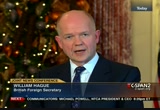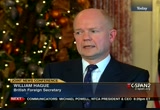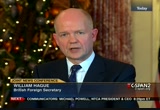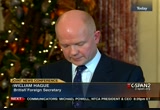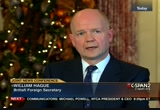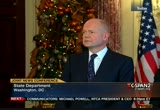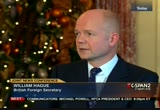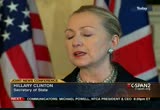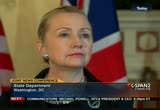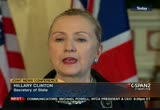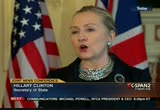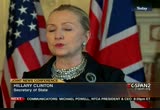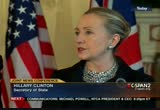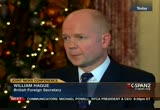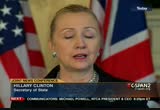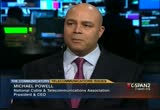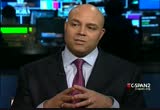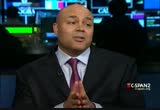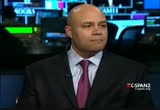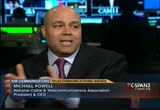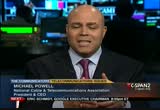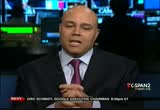tv The Communicators CSPAN December 12, 2011 8:00pm-8:30pm EST
8:00 pm
8:01 pm
>> the fire wall is big enough for the euro zone and banks are adequately recapitalized, and that countries like greece have adequately dealt with the problem. we cannot sign a european treaty not giving adequate protection to the single market in europe, but we are not changing our relationship with the european union, and we will work with our european partners over the coming months on the need for the e.u. to remove barriers to trade, to complete the single market, to conclude free trade agreement around the world. these remain the most important way for europe to compete and address economic problems and generate essential growth. as you've heard, we share a
8:02 pm
growing concern with the united states about the situation in syria, and the deplorable violence orchestrated by the regime, and we welcome the continued efforts of the arab league and call on the international community to unite in condemnation of events in syria. our talks reaffirmed our country's close understanding of the threat posed by iran's nuclear program, particularly thank secretary clinton for her robust support over the recent attacks on our embassy and teheran and shared thinking on the expansion of sanctions against iran including european union consideration of measures against the iranian energy sector as part of the pressure on iran to return to negotiations over its nuclear ambitions. we discussed the middle east peace process and the need for a return to negotiations that cannot safely be delayed. i briefed secretary clinton on
8:03 pm
the preparations for the london conference on somalia in february. we need a stronger international approach to the crisis there, and to seize the opportunity now to address the root causes of terrorism, instability, and piracy spending a lot of time and attention on this in the early months of 2012 and see it as a key priority in 2012 next year looking forward to continuing to work with secretary clinton on it.ed
8:04 pm
secretary clinton is rightly described as unfinished business, and we strongly support that region's integration with euro-atlatic structures. we share territorial activity as the single sovereign state and discussed ways in which we can intensify our efforts working with the office the high representative, the e.u., and other nations to help the country turn a new page in 2012. we discussed our diplomacy in the asia pacific region and the united states announcements about that region in recent
8:05 pm
weeks, and in that regard, i'm particularly welcoming secretary clinton's recent visit to berma to see freedom there and see production that furthers the goal which is important. i'll visit in early january, and we will remaybe in close contact with the u.s. on this issue as in all other issues i mentioned in the coming months. in all areas, britain does not have a more important ally than the united states, and i look forward to all our work together over the coming year, and that is as effective and durable as it has been this year and so many other years before it. thank you very much, indeed. >> thank you. >> [inaudible] >> thank you. two questions for you. first, secretary hague, you i know you said not changing the relationship with the e.u., but
8:06 pm
do you believe that the british government's decision on the euro zone diminishes the influence in europe and perhaps in the world, and a question for both of you -- secretary hague, you said you welcome the investigation into the allegations of fraud in the elections in russia, and do you trust -- do you both trust that the results will be what is required and will it lay the concerns of the protesters? what do you think the russian authorities should do beyond an investigation to address those concerns 1234 >> well, on the second question, that will depend on the investigation and what it produces and how it is conducted. it's spornt that such in-- it is spornt -- important that such investigations take place and welcome the willingness of the russian government to do that. as nations believing in democracy and freedom of speech and in political freedom, we want to see such investigation
8:07 pm
take place as transparently and as fully as possible, but it's impossible to judge them in advance. on the question of the european union -- no, i don't agree with the thrust of your question. on all of the issues we've just been describing, all the foreign policy issues and dealing with iran and pressure on syria and how to take forward the middle east peace process, the european union is an important player, very important player in the world, and in both in determines of european union's attitude on all issues, the united kingdom plays an absolutely central and leading role. we also do so in pushing forward the single markets in europe, in champ uponning free trade agreement like that we signed with south korea earlier this year, and all ever that continues. that does not change because we choose not to participate in one set of arrangements which are not adequate for it, and that's
8:08 pm
not a new thing to do. the united kingdom did not join the euro, and we are glad, and we are satisfied that we're not, and europe can develop, in a way in which there's overlapping circles of decision making, and not every nation has to participate in everything, but that doesn't alter, however, how our central role in driving forward european policy on the whole range of subjects that i just described. >> i would just add to what william already said about russia. we were pleased that the protests yesterday were peaceful. we think that's a good sign. there were dozens of them across the country, and the fact that the government has announced that it is willing to investigate allegations of fraud and manipulation associated with the december 4 elections is a
8:09 pm
good sign, and a reassuring position for the russian people, but the proof is in the puddle. we'll wait and see how they conduct such an investigation and what the consequences are. there's a good road map coming that has set forth a number of recommendations, so we are -- we are supportive of the announcement of the investigation, and now we hope that it will be followed through on. >> last week, an american general in baghdad said he was not sure what would happen in iraq after the last american troops have left. after december 31st, your own department, madam secretary, will be, as it were, in charge of american interest in baghdad and in iraq. how confident are you that iraq
8:10 pm
is going to turn into the sort of country, perhaps, you had in mind when this all began? >> well, we have been having very intensive discussions with president -- prime minister malaki and various members of the government last night through into the morning in the oval office with the president, and we certainly are looking forward to a normal relationship between two sovereign countries. the outlining for the actions was set prior to this administration coming into office in 2008 when the bush administration agreed that our military presence would end at the end of this year, and that is going to happen. we hope, in fact, that our troops will be out in time for christmas, and then we will be taking on a case-by-case basis
8:11 pm
requests for additional assistance of which there are many coming from the iraqis. certainly, in the security and the military training arena, there is quite a long list of requests, and we are looking forward to evaluating those and fulfilling them wherever possible. we are going to be working on police training, which is getting underway. we have a number of agreements that have been worked on under the strategic framework adopted back in 2008, so we're on the path to meet our commitment to withdraw all u.s. military personnel even as we maintain a robust civilian presence under state department leadership that'll include diplomats, business and development
8:12 pm
experts, security assistance experts, law enforcement officers, and others from civilian agencies across the united states government. they will be working out of our embassy in baghdad, out of our consulate's general, our diplomatic presence in curcook, and they will be protected as civilians are in many places in the world by contracted security personnel. that's a very common practice so, again, last night and today, our iraqi partners made clear that they want a relationship that is deeper and broader nan a mill -- broader and deeper than a military relationship, and we are working to achieve that. >> thank you. madam secretary, if i could follow-up on iraq. was there any resolution in your
8:13 pm
meetings about the fate of the last detainee? >> i can't hear you. >> sorry. i'll repeat it. any resolution in your meetings with the iraq, the state of the last detainee, and asking you both on iran, with the drone crash, the attack on the embassy, the various assassinations, the explosion of the missile factory recently with the iaea finding, is there a risk now that the countries are lurching towards confrontation with iran, and specifically, madam secretary, the senate voted to expand u.s. sanctions to include the iranian central bank. where do you stand on negotiations? thank you. >> well, steven, first, you know, with respect to actions regarding iran, we are very clearly making known our
8:14 pm
concerns. you know, we submitted a formal request for the return of our lost equipment as we would in any situation to any government around the world given iran's behavior to date, we do not expect them to comply, but we are dealing with all of these provocations and concerning actions taken by iran in close concert with our closest allies and partners starting with the u.k.. we obviously believe strongly in a diplomatic approach. we want to see the iranians engage, and as you know, we have attempted to bring about that engagement over the course of the last three plus years. it has not proven effective, but we're not giving up on it, and with respect to any actions on
8:15 pm
further sanctions, we have been very tough and not only did we work hard to get international sanctions through the united nations, but we, along with close partners like the u.k., like the e.u., and others have applied additional sanctions, and we will continue to do so. i'm not going to telegraph where, when, and how, but our view is that the path that iran seems to be going down is a dangerous one for themselves and for the region, and the danger is compounded on top of their provocation, their deliberate support for terrorism in many places, by their continuing pursuit of a nuclear weapon, so it's something that the world has to respond to, and i think we've been effective in doing so. with respect to the first question, that is still a matter of discussion between us and the
8:16 pm
iraqis. >> and on iran, as hillary says, we're not giving up on engagements with iran, but on a number of occasions iran has not behaved 234 in a way, and we have seen in the plots to assassinate the saudi ambassador here and the invasion of the british embassy compound in teheran, an increasing preed lix for dangerous and illegal adventures on the half of at least part of the iranian regime, maybe not all, but at least parts of the irani regime, they have been sanctioned. we will increase it on iran. we see it not as confrontation, but a necessary response to the nuclear program. we adopted in the european union ten days ago, sanctions on an
8:17 pm
additional 180 individuals and entities, and we will expand those sanctions further or intend to do so at the end of january with tougher sanctions on the financial sector, the energy and transport sectors from the european union as a whole, and so we will continue to intensify that fashion. while iran's nuclear program continues with no adequate explanation of a peaceful purpose. >> madam secretary, can i just ask you does britain's new position in europe concern you? especially begin the historic bridge that the u.k. has offered between europe and the u.s.? >> i have to say it does not. i think that the role that the u.k. has played in europe will continue, and we have, of
8:18 pm
course, welcomed that, and our concern has not been over the position that the u.k. has taken. it's whether the decisions made by other members of the euro zone countries within the e.u. will work, and we want to encourage that. we are very hopeful and supportive that this latest set of actions will send the right signals with the results that are being sought, and so i separate out the economic issues, which as william said, the u.k.'s never been a party to the euro, so that's not something particularly that's going to change, and from the political work we do almost every day with the u.k. and with the e.u. so i don't see any spillover there at my view. thank you.
8:20 pm
>> michael powell on key issues affecting the cable and telecom industries. >> host: well, it's been about eight months since michael powell has been president and ceo of the cable association, and now, mr. powell, thank you for being on the communicators. >> guest: my pleasure. thank you for having me. >> host: what's the biggest policy issue facing you in 2011? >> guest: it's not that easy to answer because increasingly a lot of the principle issues that we're focused on are a consequence of convergence on what's coming out of the web so if you add up the issues we've been heavily foe c'sed about, a
8:21 pm
lot -- focused about, a lot of them are connection with web issues. take privacy, an important issue driven by the headlines associated with facebook or google, but yet they have implications for the infrastructure providers as well. cyber security is an important issue to us and growing more significant by the day, but that also grows out of our anxiety about an ever-increasing online digital economy. the days of traditional section 625 of the telecommunication act dispute are much less these days, and part of me thinks that's a good thing, but increasingly we deal with issues dealing with the ambiguity of the intersection of the web and traditional infrastructure. >> host: there's bills going through congress. are you supporting or opposing any of them? >> guest: very engaged with them. those things still have some ways to go. you know, we have a couple of principles important to us. one is we believe over time
8:22 pm
there's not going to be as many distinctions as what we do as an industry and what you call the web doing for industry. take, for example, interactive advertising or the use of met metadata and things cable industries will want to do as well. we are not left out of the equation, whatever balance is struck in privacy for the web is something that we're able to take advantage of as well, but at the same time, you know, we live with legacy regulations that had that same impulse, but at a different moment in time. you know, we live by regulatory telecom act rules on privacy written well over more than a decade ago, of course, 15 years ago, that we are very concerned about living under multiple regulatory regimes that are not real congruent, and we're always focused on ensuring we can harmonize that across the board. >> host: let's bring kim hart,
8:23 pm
senior technology reporter for "politico" into the conversation. welcome, kim. >> guest: thank you. cyber security is a big issue for you and you are a provider of broadband to businesses and consumers. what do you think about the direction cyber security legislation is going and the white house's involvement and how the private sector should be involved in the discussion? >> guest: yeah, at the big level, it's all healthy and all important. you know, there's various views about a major comprehensive approach to all elements of privacy, others want to move the pieces, but we're willing to be engaged 234 -- in all of it. we were a supporter of mike roger's bill, one of the first to get moving. we launched in cta there with him and his team. we think that that kind of purchase is critical because the biggest thing, my view is what you don't know can't hurt you, and there's the state government
8:24 pm
with access to all kinds of information to cyberthreats and roles of other international governments not shared with or fully appreciated by industries like ore own, and so his bill where you're able to bring together an entrusted forum, the ability to share and coordinate information, as long as you are fairful about the need to protect the privacy of consumers, we think that's a really constructive approach. there's other bills and approaches working their way tho. through. i don't think we have a strong view any of them are wrong other than we think more is not known than known, and it has to be legislation that can breathe and evolve and doesn't get heavily prescriptive in a way you try to rewrite it every time you learn something new. it can be too straight jacketed in a rule specific way. >> guest: in talking about the cable industry being, still being under regulatory regime
8:25 pm
and a legislative regime that's 15 years old, more than that that you just mentioned, do you think the telecom act should be rewritten to better reflect the age we're in in a competitive dynamic? >> guest: i do, but i'm not one who thinks, oh, my gosh, let's rewrite the entire act, all 257,000 words of it tomorrow. i think it's fading and relevant. if i took every speech of the current chairman of the fcc, my good friend, and see how many times he's mentioned the word "broadband" and "access rules" or "telecom interconnected policies" and i think there would be a huge disconnect and the word "internet" barely appears in the act. we are still regulating in
8:26 pm
bulcanized bucket. if you use co-ax cable, you're a title vi internet provider, but with industries of every type and stripe, almost all regulatory questions now are gray because the agent does not provide clarity and creates disputes and a lot of litigation. it heavy inefficiency in the statute. it's going to die under its own weight, and it's growing, i would argue, and at one point, i think, you know congress has to migrate us out of it. i think that's my thinking about it. migrate to a bit is a bit of regulatory world opposed to shatter it and try to rewrite the same thing in another four year dramatic exercise. i believe you can have a stably shorter broadband bill that is standards based, more flexible, that sort of rewards companies for investing and migrating to it and let the act collapse
8:27 pm
under its own weight. >> host: peter stern of time warner was quoted as saying that time warner is essentially a broadband provider and that television shows that as a cable company provides are simply a convenience at that point. do you agree with that? >> guest: well, embedded in a statement like that are multiple levels. from a technology and architecture stand point, it's certainly true. a pipe is a pipe now. data is data. pictures in one or video in another order. there's conversation, and, again, we have a statute treating each of the services like a completely different regulatory category, but when an engineer sits down to build an ip data network today, none of that comes into consideration, so number one, we spent 100 years almost regulating networks based on technological characteristics, and most of
8:28 pm
broadcasting is based on the idea of distributing through a channel of licenses. today, that's not true at all. from a technology stand point, and from a business standpoint if you're a cable operator, increasingly this is the growth part of your business. it's the higher margin part of your business. it's the part of the business your consumers increasingly demand and can't do without. it's the 2 21st century architecture and if all applications are data on the network, and fundamentally picture a world where no matter what service you provide it it's in the same way as web pages. it sounds dramatic and exciting to see tv is an app, but it's a compelling service people like, morph in the way it's delivered, how consumers interact with it, morph in the way consumers can layer things on to it, but i think it's still a really compelling offering, and i think cable will be in that business for a long time.
8:29 pm
>> guest: so how does spectrum into that equation? it's been such a huge part of what the fcc's agenda has been in efforts to increase broadband and ensure expansion and adoption happen in a timely matter. how does the cable industry see spectrum playing into its business models going forward with the new deals with verizon. >> guest: an important and challenging question because i think, you know, let's not call it spectrum because that's resourceful, but there's certain capabilities you increasingly want to provide as part of the consumer experience; right? we are all quick to say we want any time, any where, and my children deserve a world to move around and do the following things, but you're saying you need a mobility and function to provide you a service. you want to export your experience so you're not at the timerred to a time, plashings and location; right? sec --
158 Views
IN COLLECTIONS
CSPAN2 Television Archive
Television Archive  Television Archive News Search Service
Television Archive News Search Service 
Uploaded by TV Archive on

 Live Music Archive
Live Music Archive Librivox Free Audio
Librivox Free Audio Metropolitan Museum
Metropolitan Museum Cleveland Museum of Art
Cleveland Museum of Art Internet Arcade
Internet Arcade Console Living Room
Console Living Room Books to Borrow
Books to Borrow Open Library
Open Library TV News
TV News Understanding 9/11
Understanding 9/11